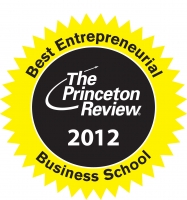BYU Ranks 2nd in the Nation for Entrepreneurship
PROVO, Utah – Sep 29, 2011 – Brigham Young University's entrepreneurship students are some of the best prepared to start their own businesses, according to a recent survey by The Princeton Review for Entrepreneur magazine. BYU's Rollins Center for Entrepreneurship and Technology graduate and undergraduate programs came in at No. 2 and No. 7, respectively. This is the second year in a row both programs have made it in the top 10, with the graduate program moving up two spots.
"We are pleased with the national recognition of the entrepreneurship programs," says Scott Petersen, managing director of the Rollins Center. "The entrepreneurship faculty and volunteers work hard to help students shape their ideas and to provide the necessary mentoring to successfully launch their business ventures."
The Princeton Review surveys more than 2,000 colleges each year to rank the nation's top programs. Colleges were evaluated based on key criteria in the areas of teaching entrepreneurship fundamentals in the classroom, staffing departments with successful entrepreneurs, offering excellent mentorship, and providing entrepreneurial opportunities outside of the classroom, as well as including distinguishable aspects in their programs.
Michael Thompson, Marriott School associate dean, credits the Rollins Center for giving students real-world entrepreneurial skills beyond corporate management.
"Entrepreneurship takes a creative idea, but it also takes creative business thinking to get that idea to a marketplace," Thompson says. "The Rollins Center teaches entrepreneurship as a way of seeing the world, solving problems and identifying opportunities that don't always come with traditional business education."
Stephen Liddle, academic director of the Rollins Center, says BYU's programs excel because of their unique curriculum and emphasis on lean startup principles — developing customer models and product markets before the product is developed.
"I think our faculty is doing a great job of bringing a new style of education to entrepreneurship," Liddle says. "Most business schools teach execution on a known business problem. In entrepreneurship, you're searching for a viable but still unknown business model. It's a search process opposed to an execution process."
Liddle says BYU's mentorship program is also key to the success of students, particularly the Founders organization, comprised of practicing entrepreneurs who share their startup experience with current students.
"Our cadre of world class mentors is an extremely valuable resource," he says. "Many are still active in their businesses, and they love giving back to the students and helping them figure out where to go from here."
More than 4,000 students enroll in BYU entrepreneurial courses each year, and numerous graduates start their own successful businesses. A defining reason for their achievement, according to Petersen, is their ethical leadership, value system and personal motivation.
"These students go on to distinguish themselves, not only in entrepreneurship but also in all the areas they pursue," Petersen says.
The complete list of rankings is available in the October issue of Entrepreneur magazine, both in print and online. The complete list can be found at www.entrepreneur.com/topcolleges/honors.
Media Contact: Chad Little (801) 422-1512
Writer: Janet Barton




